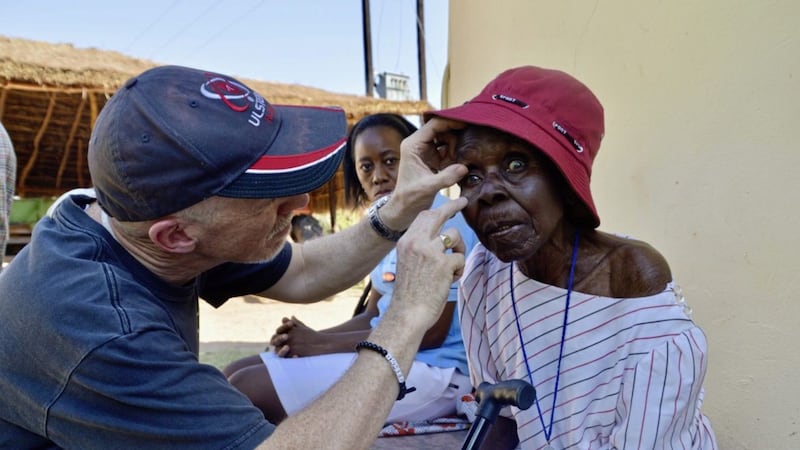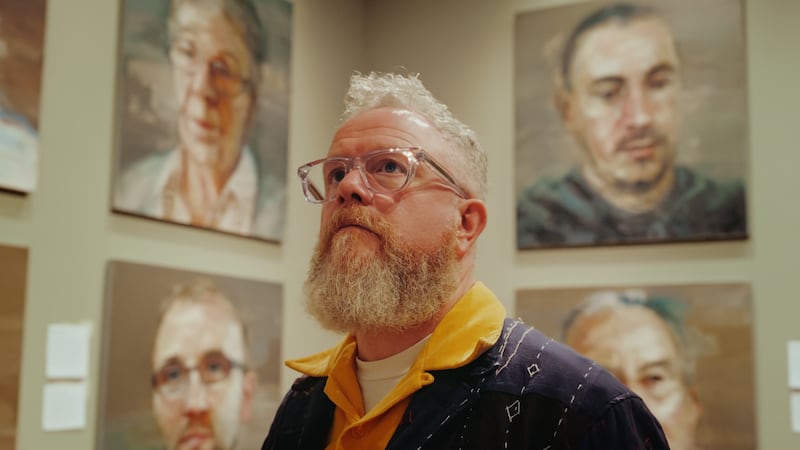IMAGINE losing your sight and, in turn, your livelihood and future, due to something as basic as not being prescribed the correct pair of glasses or failure to have a cataract removed.
That’s the everyday, cruel reality facing millions of people in developing countries, with figures estimating that 75 per cent of all blindness globally could be prevented or treated.
However, two leading Belfast eye specialists are among a group of Northern Ireland people working to address that injustice.
Optometrists Professor Jonathan Jackson and Andrew Spence are members of the small, voluntary Northern Ireland committee of international blindness and disability charity CBM (Christian Blind Mission), headed by hard-working chairman Jimmy Moore.
Jonathan (63) is head of optometry at the Royal Victoria Hospital and the first hospital optometrist ever in Northern Ireland, while Andrew (42) is a senior optometrist at Cathedral Eye Clinic in Belfast and lecturer at the Optometry School at Ulster University’s Coleraine campus.
Both men have travelled to Zimbabwe twice, in 2017 and 2019, to treat patients and train local people, and were preparing to return when the coronavirus pandemic hit.
Unable to contribute in a hands-on capacity at present, they are instead highlighting the charity’s ‘Light up Lives’ appeal which aims to help people living with treatable blindness access sight-saving surgery, eye treatments and glasses.
Until May 20, every pound donated to the appeal will be doubled by the British government, an initiative which Jonathan describes as a “fantastic” opportunity.
The Carryduff native, who set up the Royal’s first optometry department 35 years ago and now heads a staff of 40, says the biggest issue in the developing world is cataracts.
“Seventy-five per cent of blindness is caused by cataracts, yet in terms of an experienced surgeon, cataract surgery is relatively straightforward,” he explains.
Indeed, one of his favourite memories of his time in Africa is the reaction of a grateful grandmother, Violet, who had her vision restored after her cataracts were removed. Her sight had begun to deteriorate rapidly five years previously, with the result that she couldn’t look after the house or animals and, worst of all, couldn’t see her grandchildren’s faces.
After travelling for more than six hours across bumpy roads to get to the hospital and borrowing money from friends for the bus fare, Violet had the surgery.
“The next day, the nurse technician took the pad off her eye and Violet burst out into this song of thanks and then others joined in. If you can imagine a southern American gospel choir, that’s what it was like. It was an amazing sight,” recalls Jonathan, still taking obvious delight in the memory.
“I would have a lot of patients here saying to me ‘You have changed my life’ but never anything like that before!”
He also describes meeting a disabled girl who made dresses for the community but couldn’t see them properly.
“She was provided with glasses, which enabled her to see the detail of what she was doing and generated income that allowed her to be independent. She was just over the moon,” he says.
“Another little boy we saw had a serious infection around one eye which could easily have caused the loss of the eye. He needed to be transferred from the rural community where he lived to Harare for the condition to be dealt with.
“CBM also invest in the transport network so we were able to get him to hospital and treat him with antibiotics to control the infection and save the eye.”
So vital and highly appreciated is the charity’s work that people turn up from sunrise and queue for screening.
Jonathan emphasises that one of the main goals is to train and help local people so they will be able to deliver the care in their own communities in future.
He adds: “The Zimbabwean people are absolutely wonderful people and it’s a beautiful country but it has been devastated by bad management under previous political regimes.
“The places where it’s hardest to get care are remote, rural areas. There is nobody there to provide services so agencies and charities like CBM are involved in outreach camps and training exercises.
“We were meant to go out again when Covid hit. Covid has impacted in a massive way here in Northern Ireland on our services… but it has had a devastating effect in Zimbabwe, because they can’t get the vaccines the same way we can.
“Their services were stopped completely and they are just resuming now. It’s a very difficult time and as they emerge from Covid they are going to need all the help they can, in terms of both service delivery and training.”
As well as cataracts, one of the most pressing issues in the country is children’s eye care. Andrew, a father-of-three who lives in Portstewart, says the biggest cause of blindness among children is not getting the correct glasses between the crucial ages of two and 12 years.
He is particularly excited about a university bursary for optometry students.
“It’s £176 for their tuition fees for the year. It’s a small amount of money and it is giving someone really good skills for life,” he says. “If we can get more optometry graduates out there and into the community, it means all these young people who are treated can get a job, they can drive a car, become an engineer or do whatever they want to do.”
One child whose future was secured thanks to early intervention was a nine-year-old boy who had helped bring his grandmother to the clinic after her successful cataract operation.
“She was telling the nurse what a good boy he was and how he helped her and she mentioned that his sight wasn’t very good,” explains Andrew.
“We had a look at him and he had cataract there and we were able to pay for his surgery and give him his sight and his future back.”
Both men are itching to return to Zimbabwe as soon as Covid restrictions ease and see for themselves the difference that the Light up Lives campaign is making. The charity is hoping to raise enough to fund a three-year project to reduce avoidable blindness in the county, train staff, equip hospitals and enable over 44,000 people with eye health problems to access treatment.
So what motivates both men to spend their holiday leave in a struggling African country rather than relaxing with their families, pursuing hobbies or enjoying some down time?
For Jonathan, a keen cyclist and Ulster Rugby fan, father-of-three and ‘Pops’ to three much-loved grandchildren, it’s a strong Christian faith and the desire to help those who are disadvantaged, poor or disabled and need help to maximise their potential.
“But I’m no saint!” he laughingly insists. “I absolutely love what I do. I thank God for the career I’ve had for nearly 40 years. I’ve been very blessed.”
For Andrew, it’s the satisfaction of changing lives for the better. He also believes the voluntary work gives him a fresh outlook on life.
“You can become very self-obsessed and self-focused. It’s good to become involved in a different country with different problems and gain a different perspective on your own life,” he says.
:: To donate or find out more, visit lightuplives.net



